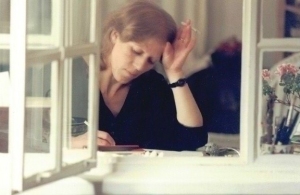I must have been 4 or 5 years old when my mother took me to Berlin to see my maternal grandmother for the first, and, as it turned out, the last time. Due to the Soviet Berlin blockade after the war, the severe lack of resources, and the disrupted transport system, many families were kept apart for years.
We stared up a bleak wall, until Hildegard appeared. She flung her arms towards us, wanting wings, leaning precariously from the window of the hospital ward where she was kept isolated with TB.
Or so we  thought. A nurse confided her doubt to my mother, and how she had urged for a second opinion, a hint my grandfather ignored. My mother insisted on a fresh blood test, but was ridiculed by the doctor in charge.
thought. A nurse confided her doubt to my mother, and how she had urged for a second opinion, a hint my grandfather ignored. My mother insisted on a fresh blood test, but was ridiculed by the doctor in charge.
To console me, a kind neighbour rescued an old bicycle and taught me how to ride it among the rubble of ruins in the streets. He also allowed me to watch him construct a ship with sails inside a bottle, which made me think of gran being confined, not sailing anywhere. The atmosphere between my mother and her father grew tense. She insisted he should query the doctor’s diagnosis.
The crescendo happened in the kitchen, when she lifted a tray of 2 dozen eggs from the top of the fridge. He said, ‘You won’t.’ She said, ‘I will.’ He demanded, ‘You will not.’ She shouted, ‘I will.’ He shouted, ‘What can a nurse know?’
That’s what did it. Two dozen yellows and whites marbled the red-tiled floor and my mother walked out. I was thrilled. The drama mobilised my grandfather to challenge the hospital.
Sadly, my gran died within days, much too young, and not of TB. The blood test had been mixed up. What killed her were toxic medications based on a wrong diagnosis.
The message went deep. I was going to be a warrior. I learned to appreciate my intuitions and developed a useful allergy against intimidating authority.
Memories of my paternal grandparents are more serene.  Oma was a tall, striking woman. Despite having lived through two tragic wars she kept her back straight and held her head high into old age. When she caught me sitting crouched, she would gently push her fist into my back – ‘Free that, spine girl.’ At other times, she advised me to pull superfluous thoughts from my nose. The tricks work to this day … sometimes.
Oma was a tall, striking woman. Despite having lived through two tragic wars she kept her back straight and held her head high into old age. When she caught me sitting crouched, she would gently push her fist into my back – ‘Free that, spine girl.’ At other times, she advised me to pull superfluous thoughts from my nose. The tricks work to this day … sometimes.
My parents had moved south towards the Alps after my birth, but we regularly visited my grandparent’s home in Erlangen. With fine weather, we would walk across the River Schwabach into the wooded hills to have a picnic. Oma would place several handkerchiefs on the moss under fir trees for us to sit on. Once we were settled, she spread out the much anticipated picnic treats from her basket, with plates, cutlery, napkins and all. My favourite treat was Gugelhupf Marble Cake. Increasingly, my imagination was plagued by the secrets of her handbag. During one of our picnics I dared to ask why her bag was so bulky. Forthcoming, Oma explained how during the war, before I came along, when sirens frequently announced bombing alerts, they needed to drop everything and rush to the underground shelters.
 ‘I developed a habit of having our survival gear ready at short notice,’ she said. To my delight, she displayed her survival gear on the forest floor:
‘I developed a habit of having our survival gear ready at short notice,’ she said. To my delight, she displayed her survival gear on the forest floor:
Identity papers, notebook, pens, her favourite recipes, dried fruit, a pocketknife, matches, candles, string, clothes pegs, a scissor, plaster, ointment, cotton strips, tin opener, mirror, needles and yarn, buttons, a slim book of Rilke poems, a small bottle of Brandy … and spare knickers.
To this day I never leave the house without identity papers, notebook, pen, and a slim book of poetry. Skipping knickers 🙂 I carry a shrill-sounding whistle, visa cards, a pay-as-you-go mobile, a Barret in case it rains, and a small makeup bag. Times changed, or have they?
Opa, a dreamer like me, enticed me to create imaginary scenarios in the soft, black forest soil. We sculpted landscapes, with villages, a pond made of gran’s round mirror, churches, roads, rivers, bridges and hills, using pinecones, sticks and stones, and tiny people made of leftover food and chocolate wrappers.
I came to value the creative power of sculpting when it comes to out warding inner worlds. I encourage my therapy clients to shape sand in a tray and and to populate the landscape with world objects.
The recent post of an online friend, Katia, reminded me of my paternal grandmother, and the incident with the handbag I had in mind to share. Memory swerved and expanded. It occurred to me that whether we are grandparents, aunties, uncles or family friends with the benefit of a certain age, our influence on young ones has a timeless quality. Children may crown us with a halo of mystery. Given this kind of power, even small incidents, benevolent or troubling, can leave deep impressions and impact lives, nursing stories that travel onwards through generations.





